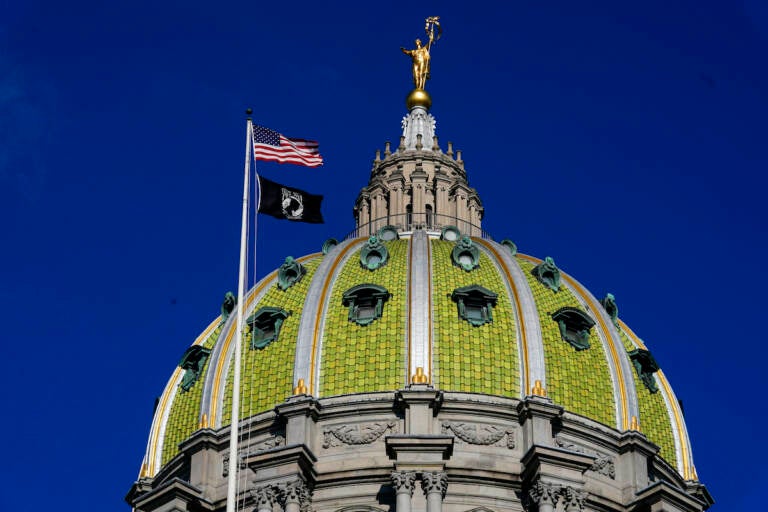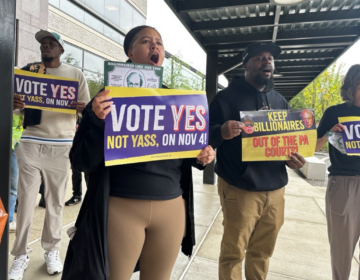Pennsylvania should have longer voter registration period, optional mail-in ballot secrecy envelopes, agency recommends
A new Pennsylvania state government report suggests making secrecy envelopes optional, standardizing the use of drop boxes across the state, and more.

The Pennsylvania Capitol in Harrisburg, Pa., Tuesday, Feb. 8, 2022. (AP Photo/Matt Rourke)
This story originally appeared on WITF.
A new Pennsylvania state government report suggests making secrecy envelopes optional, standardizing the use of drop boxes across the state, and clarifying how ballots should be dated.
It was published by the Joint State Government Commission, a bipartisan research agency designed to inform Pennsylvania lawmakers, and presents five proposals designed to eliminate confusion at the polls – and minimize post-election lawsuits.
Project Manager Yvonne Hursh said secrecy envelopes are antiquated, and failing to use one shouldn’t disqualify any otherwise legal votes.
“When I first started voting in the ‘70s, absentee ballots were counted at the polling place. So it was easier, especially in smaller communities, for people to see a ballot and maybe recognize somebody’s handwriting or know who submitted absentee ballots or whatever,” Hursh said. “But now, they’re using envelope-opening technology. And so the individual handling of the ballots and the ability to really count them, track them, really isn’t there. So if you don’t use the second envelope, we’ll treat that as a waiver of that security.”
One of the recommendations includes giving voters at least five extra days to fill out mail-in and absentee ballot applications, in part, so votes don’t get lost in the mail.
“The ability to request a mail-in ballot online, have it mailed to you, complete the ballot, and mail it back in time, for it to be counted in seven days is a really tight turnaround time,” Hursh said. “And that will also stagger, for the county election people, the amount of work they have so they’re not getting everything dumped on them at once.”
She hopes lawmakers will use the report to better educate themselves, and their constituents, about the intricacies of the state’s election code. For example, some voters broke the law during the 2020 election by having someone else drop off their ballot — including former Governor Tom Wolf.
“What we’re trying to help people understand is if you’re going to use the dropbox, you need to personally take the completed ballot to the dropbox,” she said. “We’re trying to find a balance between preventing illegal behavior and not disenfranchising people because we’re making the rules so strict that it’s next to impossible to comply.”
The report was also commissioned to both dispel misinformation about election fraud and avoid the numerous election lawsuits that followed the 2020 election — the first time no excuse mail-in ballots were used in the commonwealth.
“The idea is that you’re talking to people who are experts in their own field around the state, and they’re bringing their best ideas and presenting them to the General Assembly and saying, ‘Hey, here’s some ideas that might help deal with these problems that we’ve identified, and here’s how we think you can fix them,’” Hursh said. “We provided draft legislation that any member of the General Assembly could pick up and run with and hopefully get it enacted to address some of the concerns.”
The findings were presented by the JSGC’s Election Law Advisory Board, created in 2020, and composed of county commissioners and several state Senate and House leaders.

Get daily updates from WHYY News!
WHYY is your source for fact-based, in-depth journalism and information. As a nonprofit organization, we rely on financial support from readers like you. Please give today.





